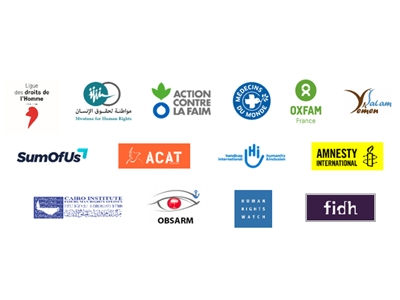Paris, 16 October 2020
14 humanitarian and human rights non-governmental organisations (NGO) urge to end France's opacity on arms sales and to establish real parliamentary control, on the occasion of the publication of the report of the fact-finding mission on arms export control on November 18th.The signatory NGOs reiterate the necessity that the Parliament could finally fulfil its duty of control over the government's action in terms of arms exports. This control is all the more essential since French arms sales have been pointed out to be responsible for certain serious violations of humanitarian law, particularly in Yemen, where those violations have dramatic consequences for the civilian population.The fact-finding mission on arms export control, whose two co-rapporteurs are MPs Michèle Tabarot and Jacques Maire, was created in December 2018 by the National Assembly's Foreign Affairs Committee, partly as a result of public opinion and NGO mobilization against French arms sales to Saudi Arabia and the United Arab Emirates, likely to be used illegally against civilians in Yemen.The publication of the fact-finding mission's report represents a unique opportunity to create greater transparency on arms trade for the following reasons:
- France, where the Parliament has no ability to exercise real control over arms sales carried out by the Executive, is an exception among the major Western democracies, while countries such as the United States, the United Kingdom and Germany established such control a while ago. Previous parliamentary initiatives calling for such control have always remained a dead letter. The Parliament and the Executive have the opportunity to put an end to this French exception and to enable the Parliament to exercise its constitutional duty of control over the Executive's actions.
- The French government continues to deliver arms to several countries responsible for serious violations against civilian populations, particularly in the Middle East. According to the Report of the Ministry of Armed Forces to the Parliament on France's arms exports, Saudi Arabia is, for the year 2019, among the top 3 countries that imported the most French arms and the United Arab Emirates has ordered a record number of French arms. And this despite their alleged responsibility for serious and repeated violations of international humanitarian law in Yemen. The drama currently unfolding in Yemen is described by the UN as one of the worst humanitarian crises in the world: due to the conflict, which is entering its seventh year, 80% of the population is now in need of humanitarian aid. This is a preventable tragedy.
- By continuing to supply arms to these countries despite the risk that they might be used to commit violations of international humanitarian law, France increases risks of harm to civilians and violates its international obligations as set out in the Arms Trade Treaty and the European Common Position 2008/944/CFSP. In April 2019, a confidential document from the Directorate of Military Intelligence dated September 2018 disclosed by the investigative media Disclose showed that French arms were in the hands of the Saudi Arabia-led military coalition in the context of the conflict in Yemen, confirming from official sources the clear risk that French arms could be used against civilian populations. The UN Panel of Eminent Experts on Yemen has also pointed out France's responsibility on several occasions. The UN Human Rights Council adopted a resolution, co-sponsored by France, on October 7, 2020, urging states to "refrain from transferring arms to any party to the conflict when they assess an overriding risk that those arms could be used to commit or facilitate a serious violation of human rights law or international humanitarian law".
- Finally, the public opinion is today calling for change. Indeed, 72% of French citizens are in favour of greater parliamentary control over arms sales and furthermore, 7 out of 10 French citizens want France to suspend its arms sales to Saudi Arabia and the United Arab Emirates because of their role in the war in Yemen, according to a YouGov poll commissioned by SumOfUs in 2019.
The debate surrounding the release of the fact-finding mission's report must enable the establishment of real control mechanisms by the Parliament as well as increased transparency towards the civil society and public opinion. At last, France must be accountable for its arms exports.The signatory NGOs:
- Action Against Hunger
- Action by Christians for the abolition of torture - ACAT-France
- Amnesty International France
- Cairo Institute for Human Rights Studies
- International Federation for Human Rights
- Handicap International - Humanity & Inclusion
- Human Rights Watch France
- League for Human Rights
- Doctors of the World
- Mwatana for Human Rights
- The Armaments Observatory
- Oxfam France
- Salam for Yemen
- SumOfUs

